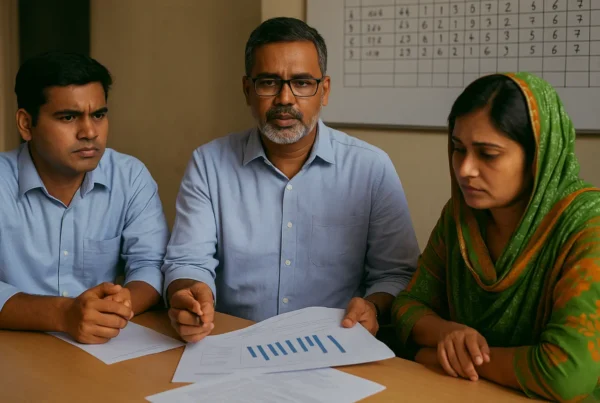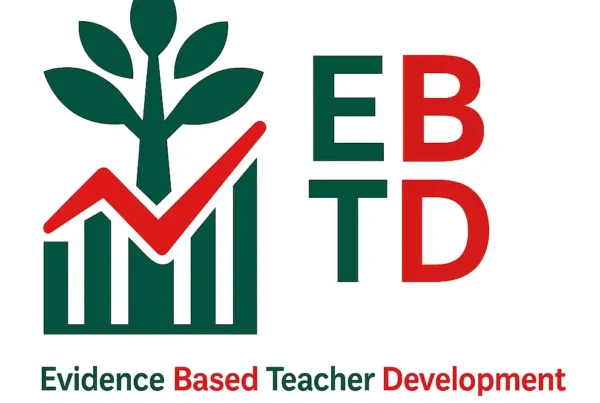Fear of Failure in Bangladeshi Schools: What the Evidence Tells Us
Why This Matters
Fear of Failure in Bangladeshi Schools – The debate. Listen to our podcast on this important issue.
If you’ve ever asked a question in class and been met with silence, or felt nervous trying something new in front of colleagues, you’ve glimpsed it: fear of being wrong.
In Bangladesh, this fear shapes the daily experiences of students, teachers, school leaders, and parents. Crucially, it is not about individuals being weak or unmotivated. It is the rational response of people operating in a system that defines success almost entirely through exam results, punishes mistakes, and ties outcomes to family pride and school reputation.
A growing body of research — both Bangladesh-specific and international — helps us understand how this plays out, and how each group’s behaviour reinforces the others in a loop of harm.
Students: Participation Under Pressure
Students are perhaps the most visible face of this fear.
-
Exams from an early age. The now-scrapped PEC and JSC exams were shown to fuel memorisation and coaching, with Bangladeshi researchers warning of “negative impacts on the psychosocial and emotional development of children” (Ahsan, 2022; CAMPE, reported in The Daily Star) .
-
Classroom silence. Studies of Bangladeshi university and school students consistently report fear of negative evaluation and communication apprehension — students hold back from speaking up for fear of embarrassment or mistakes (e.g. Chowdhury & Haider, 2012; Morshed, 2024) .
-
Mental health toll. A 2024 survey of 1,523 university admission candidates found 53.8% had depression and 33.2% had anxiety during the exam period (Hossain et al., 2024) . National suicide data show that around 14% of student suicides are linked directly to academic pressure (Prothom Alo, 2024) .
International research on “error climate” helps explain why silence makes sense: where mistakes are ridiculed, students disengage; where they are discussed constructively, motivation and achievement improve (Steuer & Dresel, 2015; Soncini, 2020). In Bangladesh, the combination of high-stakes exams and punitive classroom norms makes silence the safer choice.
Teachers: Playing It Safe
Teachers face their own version of fear.
-
Observation pressure. The Sutton Trust review shows lesson observation judgements are only ~60% reliable indicators of effectiveness (Coe et al., 2014) . Yet in Bangladesh, observations and exam results remain the key measures of teacher quality.
-
Mental strain. During COVID-19, nearly 44% of Bangladeshi teachers reported anxiety and 35% reported depression (Uddin et al., 2022) .
-
Teaching routines. In this climate, sticking to exam drilling and textbook recitation is the safest choice. Studies of pedagogy in Bangladesh consistently describe classrooms dominated by rote learning and copying, with little incentive for teachers to take risks (Anwar, 2019).
Again, this is not teacher “fault.” It is a rational response to a system that punishes missteps but rewards conformity.
Leaders: Enforcing Compliance
School leaders, too, operate under pressure.
-
Top-down structures. A 2023 study of secondary education leadership found “rock-hard top-down administration” that reduces teacher initiative and autonomy (Rahman et al., 2023) .
-
Power distance. Bangladesh’s education system reflects broader cultural patterns of high power distance, where staff rarely challenge directives and leaders default to hierarchy and control (Haque & Akter, 2024) .
-
Compliance over innovation. In practice, this means observations often focus on order and discipline rather than learning. Teachers respond with carefully scripted lessons, students remain quiet, and leaders leave reassured that “nothing went wrong.”
This defensive style of leadership mirrors what students and teachers do: avoiding risk to avoid blame. Leaders are not weak — they are responding logically to systemic incentives that equate success with pass rates and control.
Parents: Pressure and Comparison
Parents, finally, are deeply embedded in this system.
-
Heavy investment. During the PEC era, families typically spent Tk 4,000–5,000 per month on coaching and guidebooks for a single child, according to CAMPE data reported in The Daily Star .
-
Cultural weight of exams. Analyses describe public examinations as structuring the behaviour of students, teachers, and parents alike, driving shadow education and status comparisons (Nath, 2016) .
-
Conditional acceptance. Clinical accounts from Dhaka psychologists report children who believe their parents’ love depends on grades — an emerging theme supported by interviews, though not yet quantified nationally (The Business Standard, 2024) .
Daily life examples echo the data: a child scoring 90% is asked, “Why not 95%? Your cousin did better.” This isn’t cruelty but fear — the fear that anything less than the best will close doors to opportunity.
The Loop of Harm
While the evidence does not yet map every relationship in detail, it does suggest the possibility of multi-directional feedback loops that may intensify the problem.

Possible Interactions That Can Intensify the Problem
Based on the evidence, there may be several ways in which each group’s response feeds into the others. These interactions are not proven in every case, but they are plausible patterns suggested by the research:
-
Parents → Students: Strong pressure for top marks can lead to student anxiety, classroom silence, and (in some cases) depression.
-
Parents → Teachers: Demands for high scores can push teachers to focus on exam drilling rather than creative teaching.
-
Parents → Leaders: Lobbying for results and school rankings can influence leaders to emphasise compliance and pass rates.
-
Students → Parents: When children show stress or underperform, parents may respond by adding even more tutoring, deepening the cycle.
-
Students → Teachers: Silent or fearful students can lead teachers to simplify lessons, avoiding interactive or riskier methods.
-
Students → Leaders: Low student confidence or high dropout rates may pressure leaders to enforce stricter discipline.
-
Teachers → Parents: When teachers communicate progress mainly through grades, parents may become more focused on marks than learning.
-
Teachers → Leaders: Teachers avoiding innovation may make leaders feel the need to monitor more closely.
-
Leaders → Teachers: Strict observation systems can create defensive teaching and reduce experimentation.
-
Leaders → Parents: Leaders who highlight exam results as proof of school quality reinforce parents’ reliance on marks.
-
Leaders → Students: Rules and order-focused leadership may strengthen student silence and fear of being wrong
Importantly, no single study has tested this loop in its entirety in Bangladesh. What we present here is a synthesis: combining findings from different studies on parents, students, teachers, and leaders, and aligning them with international research on error climate and psychological safety.
This makes the cycle a theory of action, grounded in evidence but not yet fully proven. It highlights a gap for future research: longitudinal, multi-stakeholder studies that trace how exam pressure and fear of failure ripple through the system and reinforce themselves.
For now, what the evidence does show — consistently — is that each group’s behaviour is a rational adaptation to the pressures they face. The harm emerges not from individual weakness, but from a system that links worth to error-free performance.
Breaking the Cycle: What the Evidence Suggests
-
Classrooms: International research shows that low-stakes retrieval practice and error-friendly climates improve motivation and learning (Bjork & Bjork, 2011; Metcalfe, 2017). These could be adapted for Bangladeshi classrooms.
-
Teachers: The Sutton Trust review recommends triangulating evidence (student work, assessments, observations) rather than relying on high-stakes single lessons. This would reduce defensive teaching.
-
Leaders: Studies of organisational psychology show that psychological safety fosters innovation and productivity (Edmondson, 2019). School leaders can model this by sharing their own learning from missteps.
-
Parents: Awareness campaigns and school engagement could help shift focus from grades to effort. Research on achievement motivation in Bangladesh already shows that parental support (not pressure) predicts student success (Rahman et al., 2025).
Conclusion
The research paints a consistent picture: fear of failure in Bangladeshi schools is systemic, not personal. Students stay silent, teachers play it safe, leaders enforce compliance, and parents apply pressure — all for understandable reasons. But these behaviours reinforce one another in a loop of harm.
Breaking that loop requires systemic change: reshaping assessment, redefining accountability, rethinking leadership, and reframing parental expectations. Only then can Bangladeshi schools become places where mistakes are understood as part of learning, and where students, teachers, and leaders alike feel supported to grow.
References
-
Ahsan, M.T. (2022). Primary and Junior School Certificate exams: impacts on children’s development. Interview in The Daily Star, 25 May 2022.
-
Anwar, R. (2019). Pedagogy in Secondary Schools in Bangladesh: Rote Learning and its Implications. Dhaka: BRAC Institute of Educational Development.
-
Bjork, R.A. & Bjork, E.L. (2011). Making things hard on yourself, but in a good way: Creating desirable difficulties to enhance learning. Psychology and the Real World: Essays Illustrating Fundamental Contributions to Society, pp.56–64.
-
CAMPE (Campaign for Popular Education) (2015). Education Watch Reports. Dhaka: CAMPE.
-
Chowdhury, T.A. & Haider, M.Z. (2012). Oral communication apprehension among Bangladeshi undergraduate students. Stamford Journal of English, 7, pp.1–20.
-
Coe, R., Aloisi, C., Higgins, S. & Major, L.E. (2014). What makes great teaching? Review of the underpinning research. London: Sutton Trust.
-
Edmondson, A.C. (2019). The Fearless Organization: Creating Psychological Safety in the Workplace for Learning, Innovation, and Growth. Hoboken, NJ: Wiley.
-
Haque, M. & Akter, S. (2024). Power distance and leadership in Bangladeshi educational institutions: A critical analysis. International Journal of Education and Development, 20(2), pp.45–61.
-
Hossain, M., Rahman, A., Akter, F. et al. (2024). Depression and anxiety among admission-seeking students in Bangladesh: a cross-sectional study. Asian Journal of Psychiatry, 92, 104211.
-
Metcalfe, J. (2017). Learning from Errors. Annual Review of Psychology, 68, pp.465–489.
-
Morshed, M.M. (2024). Public speaking fear among Bangladeshi university students: causes and coping strategies. Dhaka University Journal of Social Sciences, 38(1), pp.55–72.
-
Nath, S.R. (2016). The examination system in Bangladesh and its impact on curriculum, students, teachers and society. Academia.edu.
-
Prothom Alo (2024). Report on student suicides in Bangladesh: academic pressure a major factor. Dhaka, 12 March 2024.
-
Rahman, M., Alam, S. & Begum, F. (2023). Teacher leadership in Bangladeshi secondary schools: empirical study on top-down administration. ResearchGate preprint.
-
Steuer, G. & Dresel, M. (2015). A constructive error climate as an element of effective learning environments. Learning and Instruction, 39, pp.74–84.
-
Soncini, A. (2020). Students’ perception of error climate and its effect on motivation. European Journal of Psychology of Education, 35, pp.597–614.
-
Uddin, M.J., Rahman, M.M., & Akter, S. (2022). Mental health of teachers during the COVID-19 pandemic in Bangladesh. BMC Psychiatry, 22, 637.





